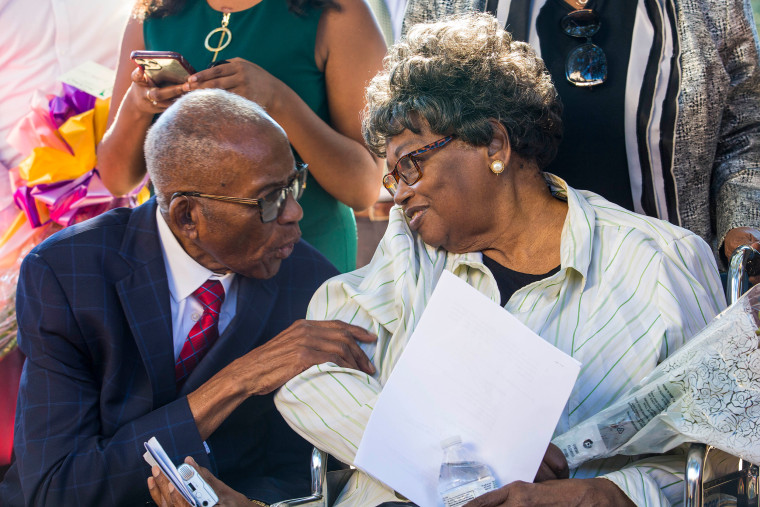 [ad_1]
[ad_1]
If you happen to don’t keep in mind the title Claudette Colvin, that could be since you by no means heard it. That her story (and people of numerous others) shouldn't be extra well-known serves as a sobering reminder that historical past is a matter of curation.
Colvin, now 84, was a teen when, on March 2, 1955, she refused to surrender her seat to a white lady whereas using a bus in Montgomery, Alabama. That act of defiance happened 9 months earlier than Rosa Parks made information for not ceding her seat to a white man.
Colvin was 15 years previous on the time. She was getting back from a visit downtown together with her mates, they usually’d boarded the bus throughout the road from the church the place Martin Luther King Jr. would later give sermons.
Colvin, now 84, was a teen when, on March 2, 1955, she refused to surrender her seat to a white lady whereas using a bus in Montgomery, Alabama.
As extra white passengers boarded, her Black friends received as much as transfer. At the moment, Colvin stated, Black individuals weren’t allowed to sit down straight throughout from white individuals. However she remained seated.
She recollects an indication that stated “Coloreds to the rear. Whites to the front.”
“I wasn’t breaking any segregation laws,” Colvin stated.
The bus driver known as over a site visitors cop to confront Colvin about why she hadn’t switched seats. “He asked why I remained seated. And I said, ‘Because I paid my fare and it’s my constitutional right.’” After it was determined the patrolman had no authority within the matter, different officers have been known as to the scene.
“They knocked the books out of my lap. That’s when they manhandled me and put me in the patrol car.”
She was taken to a metropolis jail, somewhat than a juvenile detention middle, the place she was held for a few hours.
Colvin’s expertise had all of the elements of a motion within the making, however the Montgomery NAACP — which modified its title to the Montgomery Enchancment Affiliation — determined to not advocate on Colvin’s behalf. Later that 12 months, the group did rally round Parks, who was additionally an officer for the group on the time. “I knew what the strategy was,” Colvin says. “They wanted her upfront because they knew I was a minor, and people were not going to listen to a teenager.”
That her darker-skinned complexion performed a task within the group’s determination isn’t misplaced on her, both. “They wanted Mrs. Parks because people still believed that fairer-skinned people get more acceptance than darker-complexioned people,” Colvin recollects, noting the infamous paper bag assessments once used on HBCU campuses.
Colvin would additionally later study she was pregnant. Whereas there are differing accounts of whether or not or not that factored into the group’s determination to not make her the face of the bus boycott motion, Colvin said it did.
However she doesn’t maintain any grudges.
Their dad and mom advised them to avoid me as a result of I used to be a troublemaker.”
Claudette colvin
Parks would even later take Colvin beneath her wing following the March incident, visiting her house and even encouraging the youthful lady to enter an NAACP pageant. Colvin remembers Parks as a quiet lady.
Others in Colvin’s group, notably her friends, have been noticeably much less supportive.
“Their parents told them to stay away from me because I was a troublemaker.”
Legal professional Fred Grey appeared to really feel in a different way. He determined to symbolize Colvin, in addition to 4 different girls who had related experiences on Montgomery buses. On behalf of Colvin, Aurelia S. Browder, Susie McDonald, Mary Louise Smith and Jeanetta Reese, Grey sued the town of Montgomery on Feb. 1, 1956. (Reese ultimately dropped out of the Browder v. Gayle case after she and her husband began receiving threats.)
4 months later, a court docket dominated that segregation throughout the Montgomery bus system was unconstitutional. The town appealed the choice however the ruling was upheld.
Nevertheless, Colvin didn’t stick round lengthy to witness the aftermath.
Due to the bus incident, Colvin’s sister couldn’t land employment and, fearing retaliation from the Ku Klux Klan, moved to New York. Colvin adopted, lastly realizing her dream of transferring North. After many years within the metropolis, Colvin not too long ago moved again to Alabama due to well being points.

Colvin lived a traditional life out of the limelight for almost all of her time in New York Metropolis. Her biographer, Phillip Hoose, began a campaign in 2016 to get then-President Barack Obama to award Colvin the Presidential Medal of Freedom, though it was finally unsuccessful. (Parks was bestowed the honor by Invoice Clinton in 1996.)
At present, Colvin has a becoming metaphor for her missed position in historical past.
“I think of it like a puzzle,” she stated. “I’m a piece of the puzzle that was left out in telling the whole Montgomery Bus Boycott story — not only myself, but the four women that were a part of the success of the movement.”

0 Comments